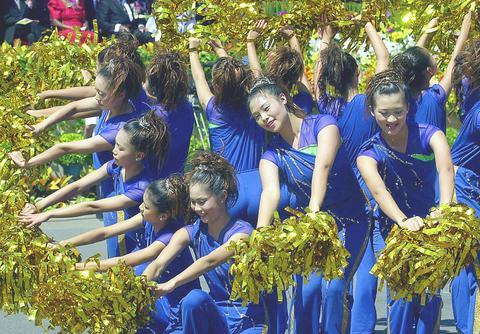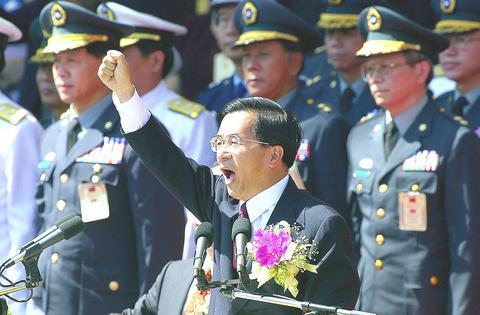In his fourth Double Ten National Day speech since he came to power, President Chen Shui-bian (
"The `door to cooperation' and the `door to peace' will always exist between the two sides of the Taiwan Strait," Chen said in his address to the public and foreign guests in front of the Presidential Office yesterday morning.
"The `door to cooperation' can open only if the `one China' and `one country, two systems' formulas are put aside," he said. "And the `door to peace' can open only when China renounces its threat to resort to the use of force and halts its strategic attempts to isolate Taiwan internationally."

PHOTO: CHIANG YING-YING, TAIPEI TIMES
Chen reaffirmed that he must safeguard Taiwan's sovereignty, security and dignity and ensure its sustainable development.
"Only those who do not believe in themselves and do not believe in Taiwan will succumb to hegemony, make concessions for peace, or try to convince us that China's military intimidation and coercion compels us to accept the so-called `one China' principle," he said.
Chen also expressed appreciation to the heads of state, ambassadors and delegations representing Taiwan's allies who were attending the 92nd anniversary of the founding of the Republic of China (ROC). Taiwan was a Japanese colony when the ROC was founded in 1911.

PHOTO: SEAN CHAO, TAIPEI TIMES
"All these years, Taiwan has been able to take an active role in the international arena, not merely because of our strong economic and trade capabilities, but, more importantly, as recognition of our relentless pursuit to put into practice our foundation of democracy and freedom," Chen said.
"Some argue that there will be more room for Taiwan on the international stage if we accept the `one China' principle. However, if we compromise our stance on sovereignty and relinquish our existing democracy and freedom, we will waive our right to join international organizations, and it will be impossible for us to ever have a voice in the global community," he said.
On the economy, Chen said: "The signs of economic recovery are increasingly evident, and momentum is building, while the most difficult times are now behind us. The indicators and ratings of international institutions provide an optimistic forecast for Taiwan's future economic performance."
"We ourselves should have faith in Taiwan," he said, "and there is no reason to heed the pessimistic rhetoric of a few."
Stressing his resolution to facilitate the development of cross-strait trade as well as his confidence in winning next year's presidential election, Chen said that though China gave no positive response to his recent proposal -- "one objective and three stages" for direct cross-strait transportation -- the government will continue to do its part.
"I have no doubt that after the presidential election next year, the development of cross-strait trade will enter a new phase," he said.
Chen ended his speech by calling on the public to have faith in democracy, in reform and in Taiwan.
During government celebrations at the Presidential Office later yesterday, Chen was to say that the government must accomplish constitutional reform by uniting all 23 million people of the country to realize the birth of a new constitution.
"If constitutional reform is to succeed, it is necessary to harness popular will, political consensus among parties and the involvement of constitutional scholars. We will not make the past mistake of having a single party push through unilateral constitutional change," the president will say. "The final draft of this constitution should be passed through a referendum involving all Taiwan's citizens."
Also See Stories:
KMT-PFP stage festivities in Chiayi
Overseas Chinese acclaim Taiwan's accomplishments

ENDEAVOR MANTA: The ship is programmed to automatically return to its designated home port and would self-destruct if seized by another party The Endeavor Manta, Taiwan’s first military-specification uncrewed surface vehicle (USV) tailor-made to operate in the Taiwan Strait in a bid to bolster the nation’s asymmetric combat capabilities made its first appearance at Kaohsiung’s Singda Harbor yesterday. Taking inspiration from Ukraine’s navy, which is using USVs to force Russia’s Black Sea fleet to take shelter within its own ports, CSBC Taiwan (台灣國際造船) established a research and development unit on USVs last year, CSBC chairman Huang Cheng-hung (黃正弘) said. With the exception of the satellite guidance system and the outboard motors — which were purchased from foreign companies that were not affiliated with Chinese-funded

PERMIT REVOKED: The influencer at a news conference said the National Immigration Agency was infringing on human rights and persecuting Chinese spouses Chinese influencer “Yaya in Taiwan” (亞亞在台灣) yesterday evening voluntarily left Taiwan, despite saying yesterday morning that she had “no intention” of leaving after her residence permit was revoked over her comments on Taiwan being “unified” with China by military force. The Ministry of the Interior yesterday had said that it could forcibly deport the influencer at midnight, but was considering taking a more flexible approach and beginning procedures this morning. The influencer, whose given name is Liu Zhenya (劉振亞), departed on a 8:45pm flight from Taipei International Airport (Songshan airport) to Fuzhou, China. Liu held a news conference at the airport at 7pm,

AIR SUPPORT: The Ministry of National Defense thanked the US for the delivery, adding that it was an indicator of the White House’s commitment to the Taiwan Relations Act Deputy Minister of National Defense Po Horng-huei (柏鴻輝) and Representative to the US Alexander Yui on Friday attended a delivery ceremony for the first of Taiwan’s long-awaited 66 F-16C/D Block 70 jets at a Lockheed Martin Corp factory in Greenville, South Carolina. “We are so proud to be the global home of the F-16 and to support Taiwan’s air defense capabilities,” US Representative William Timmons wrote on X, alongside a photograph of Taiwanese and US officials at the event. The F-16C/D Block 70 jets Taiwan ordered have the same capabilities as aircraft that had been upgraded to F-16Vs. The batch of Lockheed Martin

GRIDLOCK: The National Fire Agency’s Special Search and Rescue team is on standby to travel to the countries to help out with the rescue effort A powerful earthquake rocked Myanmar and neighboring Thailand yesterday, killing at least three people in Bangkok and burying dozens when a high-rise building under construction collapsed. Footage shared on social media from Myanmar’s second-largest city showed widespread destruction, raising fears that many were trapped under the rubble or killed. The magnitude 7.7 earthquake, with an epicenter near Mandalay in Myanmar, struck at midday and was followed by a strong magnitude 6.4 aftershock. The extent of death, injury and destruction — especially in Myanmar, which is embroiled in a civil war and where information is tightly controlled at the best of times —